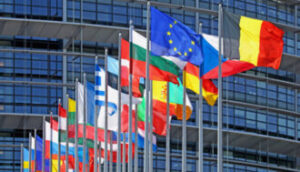
The EU Council on Friday gave final approval to the new Schengen Borders Code, a set of EU rules governing the management of internal and external borders, as well as border controls for persons.
“Traveling in the Schengen area without border controls is one of the EU’s major achievements. With today’s vote, we have given Member States the necessary tools to maintain such borderless travel within Schengen while securing external borders, tackling irregular migration and public health risks,” said Anneliese Verlinden, Minister of the Interior of the Belgian Presidency of the Council of the EU.
According to the council communiqué, this “reform plays an important role in making the Schengen area more resilient to current and future crises at its external borders.”
The regulation approved by the EU Council provides the possibility of adopting “pan-European measures that restrict the access of third-country nationals to the European Union in the event of a large-scale public health emergency.”
The regulation also introduces a procedure “to combat the secondary movement of migrants (refuseniks) from one Member State to another,” and offers solutions to situations where migrants are used at borders for political purposes.
The document explains the rules concerning the possible temporary introduction of controls at internal borders, ensuring that such actions will remain a measure of last resort when there could be “a serious threat to public policy or internal security”.
In such cases, EU states will have to assess the necessity and proportionality of the decision, as well as assess whether the goals pursued cannot be achieved by other means, Brussels explains.
At the same time, the revised code sets a maximum duration for which such controls at internal borders can be maintained. It can remain in force for a maximum of two years. In exceptional situations, internal border controls may be extended twice for a further 6 months, with the possibility of a one-year extension.
This Council Regulation shall enter into force on the twentieth day following its publication in the Official Journal of the European Union. It shall be directly applicable in EU countries.
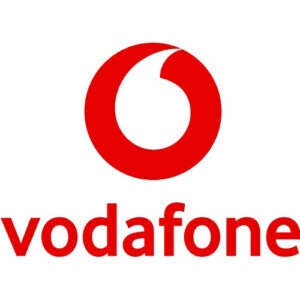
Following the attacks on the energy infrastructure in March and April, Vodafone has decided to double its planned investments in energy independence this year. Following this decision, the company plans to purchase additional generating capacity and autonomous power supply systems worth UAH 438 million. Total investments in the network’s energy resilience in 2022-2024 will exceed UAH 674 million.
Vodafone is investing in new types of batteries for its communication facilities. To improve reliability and extend the autonomous power supply time of its base stations, the company has already purchased 13.5 thousand batteries of a new lithium-ferrous type (LiFePO4). Such batteries are much better adapted to harsh operating conditions with frequent and prolonged power outages. Vodafone plans to purchase an additional 4,612 such batteries in 2024.
In addition, Vodafone will increase its generating capacity. More than 1.5 thousand base stations are already powered by generator sets, including the company’s own stationary and mobile generators, as well as generator sets of partners and customers. During the war alone, the company purchased about 500 mobile generators and the auxiliary equipment necessary for their operation. In 2024, the number of generating equipment of various types will increase by another 280 units.
Today, more than 700 partner generators ensure the network’s operation during outages, and this number is constantly growing. Vodafone is open for further cooperation – companies that have a diesel generator set and are ready to share its capacity to provide communication for their company and other subscribers within the base station coverage area can send a letter to no_blackout@vodafone.ua. Vodafone experts will be happy to discuss the details of possible cooperation.
During previous emergency outages, the company has already used more than 1,094 tons of diesel and gasoline. Vodafone’s power engineers have also ensured sufficient diesel and gasoline reserves to generate electricity to keep the grid running during the blackouts. To minimize the risks of a shortage of certain types of fuel and diversify fuel supplies, including on a regional basis, the company has increased the number of wholesale fuel suppliers with whom it has signed contracts and made significant fuel reserves.
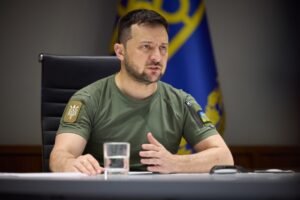
Ukraine president urges Joe Biden and Xi Jinping to ‘show your leadership’ and send message to Moscow.
The Ukraine president, Volodymyr Zelenskiy, has released a desperate video plea calling on world leaders to attend a “peace summit” next month in Switzerland, after a deadly Russian attack on a DIY hypermarket in Kharkiv on Saturday killed 12 people and injured dozens more.
Zelenskiy appealed in particular to the US president, Joe Biden, and the Chinese leader, Xi Jinping, to attend the summit, which is due to start on 15 June. “Please, show your leadership in advancing the peace – the real peace and not just a pause between the strikes,” said Zelenskiy in English.
Biden has not yet confirmed his attendance and it is not known whether China will attend – “negotiations are ongoing” over Beijing’s participation, said Zelenskiy’s aide Mykhailo Podolyak in an interview last week.
Saturday’s strike came at the end of a week in which daily Russian missile and air strikes terrorised Ukraine’s second city, with hits on a printing house, numerous residential areas and a central park, among other targets. In most cases, there were no obvious military targets nearby.
The mayor of Kharkiv, Ihor Terekhov, said about 120 people had been in the hardware store on Saturday afternoon. “The attack targeted the shopping centre, where there were many people – this is clearly terrorism,” he said.
Prosecutors said 12 people had died, of whom 10 had not yet been identified, and 43 injured. A further 16 people are missing after the strike. A separate, early evening missile strike hit a residential building in the centre of the city, injuring 18 people, according to the regional governor.
In recent weeks, Russia has been working to make life misery for Kharkiv, a city 20 miles from the borderwith Ukraine, and which had a pre-war population of over a million. Although life in the city goes on, deadly strikes have become a daily feature of life.
Because of the proximity of the city to the border, Russian fighter jets can launch glide bombs into the city centre from inside Russia. Ukrainian officials say improved air defence systems and F16 fighter jets are vital components of defending the city. The Kharkiv region has also been the focus of a new Russian offensive over the last two weeks, centred on the town of Vovchansk, which has led to thousands of residents fleeing their homes.
Russia has claimed its attacks on Kharkiv region are aimed at creating a “buffer zone” to prevent Ukrainian forces from launching strike against Russian border regions.
The strike on Saturday targeted a popular suburban shopping complex. Andriy Kudinov, its director, told local media the store had been packed with shoppers buying items for their summer cottages.
Witnesses described a panicked scene at the supermarket. “I was at my workplace. I heard the first hit and … with my colleague, we fell to the ground. There was the second hit and we were covered with debris. Then we started to crawl to the higher ground,” Dmytro Syrotenko, 26, told Reuters, speaking with a large cut on his face.
The strike sparked a fire that sent large clouds of dark smoke billowing above the shopping centre, with firefighters brought in to fight the blaze. Rescue work is dangerous in these conditions, with repeat strikes targeting first responders a common feature of recent Russian attacks.
Zelenskiy on Sunday said it was further proof that Russia is not interested in peace. “We all know who are we dealing with. Russia is run by men who want to make it a norm – burning lives, destroying cities and villages, dividing people and erasing national borders through war. There is no nation that can stop such war alone,” he said.
Zelenskiy said more than 80 countries had already confirmed their attendance at the Swiss summit. Russia is not invited, and has rubbished the event as pointless. The aim appears not to devise a workable peace formula, but to put together a large coalition of countries to call on Moscow to end the war, particularly targeting many global south countries who have remained neutral up to this point.
Podolyak, a key Zelenskiy aide, said the Ukrainian president had been spending time making calls to numerous leaders of global south countries in an effort to persuade them to attend the summit, with particular focus on Africa, Latin America and the Pacific region.
“Russians are trying everything to discredit the idea and to offer incentives for not attending,” said Podolyak, hinting at the diplomatic battle over the summit.
China, which has tacitly backed Russia in the conflict, is thought unlikely to attend, though Ukrainian diplomats are trying hard to persuade Beijing to take part in some form. China has outlined its own peace plan, which Ukrainian officials say is unworkable.
“The Chinese formula is to either force the capitulation of Ukraine, or to freeze the conflict on Russia’s terms,” said Podolyak. “China is the key country [for us], because as soon as you change its position from neutral and disinterested to neutral but fair, then pressure on Russia will start to rise,” he added.
In a report published on Friday, Reuters cited unidentified sources in Moscow claiming that President Vladimir Putin is looking for a ceasefire deal. “Putin can fight for as long as it takes, but Putin is also ready for a ceasefire – to freeze the war,” said one of the sources.
Ukrainian and many western officials have reacted sceptically to such claims, noting that without real security guarantees for Ukraine, any attempt to freeze the conflict would be meaningless.
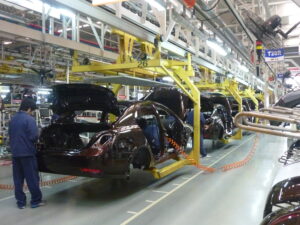
Prices of Ukrainian industrial producers increased by 3.3% in April 2024, compared to a 9.1% drop in March, the State Statistics Service (Ukrstat) reported on Friday.
The State Statistics Service specifies that between April and March 2024, prices of industrial producers within Ukraine increased by 3.6%, and by 0.9% for supplies outside the country.
According to its data, in annual terms (compared to the same month last year), industrial prices rose by 4.9% in April 2024, and by only 0.2% in March.
In the first four months of this year, the growth in industrial prices amounted to 5.7% compared to the same period in 2023.
According to the statistics agency, in the mining and quarrying industry, products fell by 0.3% in April compared to the previous month of 2024. Prices in hard coal mining decreased by 1.9%, crude oil and natural gas production by 0.4%, while prices in metal ore mining increased by 2%.
Prices increased in the supply of electricity and gas by 6.8%, in energy production by 5.4%, in the manufacture of computers, electronic and optical products by 1.5%, in chemical products by 1.1%, in metallurgy by 1%, in the manufacture of rubber and plastic products by 0.9%, in electrical equipment by 0.8%, in pharmaceutical products by 0.7%, in the food industry by 0.4%, in machine building by 0.3%, and in textile production by 0.2%.
At the same time, prices declined in the production of coke and refined products by 5.1%.
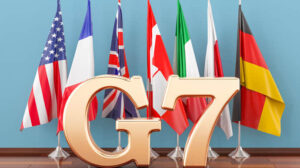
G7 finance ministers discusssed options for using interest from frozen Russian assets to help Ukraine. Kyiv has stepped up its appeals for more international financial aid to fight off Moscow’s invasion.
Finance ministers from the G7 group of wealthy democracies on Saturday cited “progress” but no breakthrough in talks on how to use frozen Russian assets to support Ukraine as it continues to battle invading Russian forces.
The meeting of the G7 ministers in the northern Italian city of Stresa focused mainly on the question of how to find more funds for Ukraine as Russia presses on with a new offensive in the Kharkiv region in the third year of its unprovoked invasion.
The G7 and its allies froze some $300 billion (€276 billion) of Russian assets shortly after Moscow launched a full-scale invasion of its neighbor in February 2022.
The meeting comes after the EU this week formally approved a plan to use interest from the Russian assets it has frozen, estimating that this could produce up to €3 billion annually for Ukraine.
What did ministers say about the talks?
The G7 finance ministers did not report any final agreement on using Russian assets on Saturday.
“We are making progress in our discussions on potential avenues to bring forward the extraordinary profits stemming from immobilized Russian sovereign assets to the benefit of Ukraine, consistent with international law and our respective legal systems,” the ministers said in a final statement.
The ministers reiterated that Russian assets will remain frozen “until Russia pays for the damage it has caused to Ukraine.” They also raise the possibility of imposing further sanctions on Moscow.
Italian Finance Minister Giancarlo Giorgetti said that the ministers had faced technical and legal issues, but were hoping to present a proposal before a G7 leaders’ summit next month in Puglia, Italy.
“We do not deny the difficulties but there is a firm determination to arrive at a solution,” he said.
What kinds of plans were discussed?
French Finance Minister Bruno Le Maire said ministers aimed to “reach a political agreement in principle” and not a ready-made solution.
A draft statement from the meeting seen by the Reuters news agency said: “We are making progress in our discussions on potential avenues to bring forward the extraordinary profits stemming from immobilized Russian sovereign assets to the benefit of Ukraine.”
The statement contained no figures or details, reflecting the fact that several legal and technical issues need to be resolved before such loans could be made.
Any detailed agreement would require the approval of G7 leaders, who meet next month in Puglia, Italy.
The United States, for its part, has been urging its G7 partners — Japan, Germany, France, Britain, Italy and Canada — to create a loan facility for Ukraine backed by future interest generated by the frozen Russian assets.
That proposal, which could raise $50 billion in the short term for Kyiv, raises several questions, including who would issue the debt and the apportioning of risk between the G7 partners.
At the end of the meeting, US Treasury Secretary Janet Yellen said that a loan for Ukraine backed by the income from frozen Russian sovereign assets is the “main option” for G7 leaders to consider in June but added that she doesn’t want to “take anything off the table as a future possibility.”
The ministers will be joined on Saturday by Ukraine’s finance minister, Serhiy Marchenko.
Source : https://www.dw.com/en/g7-makes-progress-but-no-deal-on-russian-assets-for-kyiv/a-69181131
Dynamics of import of goods in Jan-Feb 2024 by the most important items in relation to the same period of 2023, %
Source: Open4Business.com.ua and experts.news